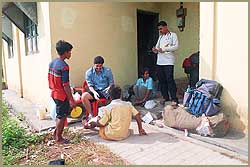|
St.
Johnís Disaster Relief Team in the Nicobars
Medical surveillance
 |
 |
| Dressing
wounds at our clinic at Bengalee village on Teressa |
Documentation
of morbidity patterns and regular feedback once again proved
vital for determining appropriate needs of the affected population
rather than accepting wrong inputs based on hearsay and rumours.
The news of Sweden sending 200,000 Cholera vaccines and the
presence of numerous health care providers (29 doctors in
one hotel we spent the night) and their vaccination supplies
at Port Blair while we awaited our flight out was totally
uncalled for and a burden on limited resources in the field.
Nowhere in the world is mass vaccination recommended for secondary
epidemics are extremely rare after natural disasters. These
decisions are probably taken far away from the ground reality
for disease surveillance on the islands does not suggest any
such need. It is also well known that vaccination needs refrigeration
to the point of service, time, skilled personnel, adequate
disposable needles and syringes - factors unrealistic in the
present situation. In addition, any of these attempts would
divert scarce resources away from more important tasks of
sanitation, protecting drinking water supplies, provision
of shelter/clothing and disease surveillance. The numerous
health care providers on the ground as we leave would be worth
the effort to make them stay back as teams to begin disease
surveillance on independent islands. Also obvious was unscientific
choice of health care personal sent in with inadequate understanding
of the epidemiology of the disaster and anticipated needs,
unprepared to function outside the four walls of a hospital.

Mr.
Ajit Chaudhuri, Executive Director & Ms.Skalzang Youdon, Programme
Officer
ajitc@intoday.com
Care
Today Fund, F14/15 Connaught Place, New Delhi 110 001, India
Telephone: 011 2331214 (direct) 011 23315801/2/3/4 Extn.287
|
|

